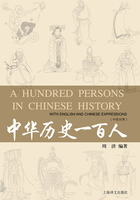
28 Xiang Yu
A Boom-to-Doom Hero

Xiang Yu (232-202 BC) was so important in Chinese culture, and those who wanted to know Chinese culture must know his story.
Xiang Yu was born into a family of military commander of Chu State (in middle and lower reaches of Yangtze) in the Warring States Period. It was said, he had two pupils in each of his eye, and his strength could push to move a mountain. Following Chen Sheng and Wu Guang’s rebelling, Xiang Yu rose up with his 8,000 fellow natives attacking Qin Empire. His army was rapidly expanded, then, he launched a decisive war against Qin’s elite forces. When he ferried across Zhang River in Hebei province to meet Qin army, he drowned ferrying boats and destroyed cooking utensils to show his determination “victory or death” (“Drown ferrying boats and destroy cooking utensils” became an idiom) that made all of Xiang’s soldiers in the field charged ahead as brave as “one confronting to ten” fighting tooth and nail to the enemies. Many rebel leaders were frightened when they stood on near-by highland to witness the valor and bravery of Xiang’s warriors. After Xiang Yu annihilated Qin Empire’s forces, all the rebel leaders came under his leadership. Xiang, by possessing 400,000 troops, gave himself a title as “Chu Hegemony King” and became a matter-of-fact new ruler of the country.
But Liu Bang started to challenge Xiang Yu’s authority. The 5-year-old war between Liu and Xiang (The Chu-Han War was the most famous and important war in history) ended up with Liu Bang’s victory and the founding of Han Dynasty. Xiang Yu failed, but historians still admired him as a hero. Was Xiang a real hero?
When Xiang Yu’s power reached its top, he received a tip-off, saying Liu Bang was stealthily planning a new war against him. At the time, Fan Zeng, Xiang’s chief counselor also realized Liu Bang was a most dangerous rival, asked Xiang to get rid of Liu. Fan Zeng worked out a scheme, inviting Liu to attend a banquet in Hong Men Village where ambushers could burst up to kill Liu. (The Hong Men Banquet became an idiom meaning a murderous trap.) When seeing the invitation, Liu Bang was scared his wits out. Everyone was on tenterhooks, only Zhang Liang, Liu’s counselor, kept level-headed, said: The only way we could do was pretending innocent and performing sorry-looking.
When Liu Bang went to the appointment, he was all smile offering precious presents to Xiang Yu and Fan Zeng, and said submissively and grievously: There must have been some rumors that made you distrust me”, then Liu repeatedly vowed to express to Xiang’s loyalty. Xiang Yu said: “It’s your officer Cao Wushang said this.” While Fan Zeng made hint gestures to Xiang to take action for several times, Xiang took them with no mind. In midway, Liu Bang escaped in excuse of going to a wash. As soon as Liu returned, he killed Cao Wushang immediately.
Because Fan Zeng was a person whom Liu Bang most dreaded of, Zhang Liang plotted a scheme to sow a discord between Xiang and Fan. When Xiang heard the rumor, he actually began to disbelieve Fan. Fan said angrily to Xiang: “You could manage by yourself”, then went away. But Fan died of a back ulcer in a small inn three days later.
The outcome of the story was now beyond doubt. The last scenario was “The Hegemony King Wept Farewell to His Concubine.” In the empty flag camp, Xiang Yu chanted a song Gai Xia Song. Accompanied with the song, Concubine Yu started to play a sword dancing. When the dancing finished, she turned the sword to kill herself.
The next morning, Xiang Yu broke out of enemy’s encirclement, ran to Wujiang River in Anhui Province, followed by hordes of pursuers. A fisherman with a boat on the bank was willing to ferry him. But Xiang, instead of boarding the boat, cried: “If I could survive, how could I have face to meet my native elders and relatives!” He raised his sword and killed himself.